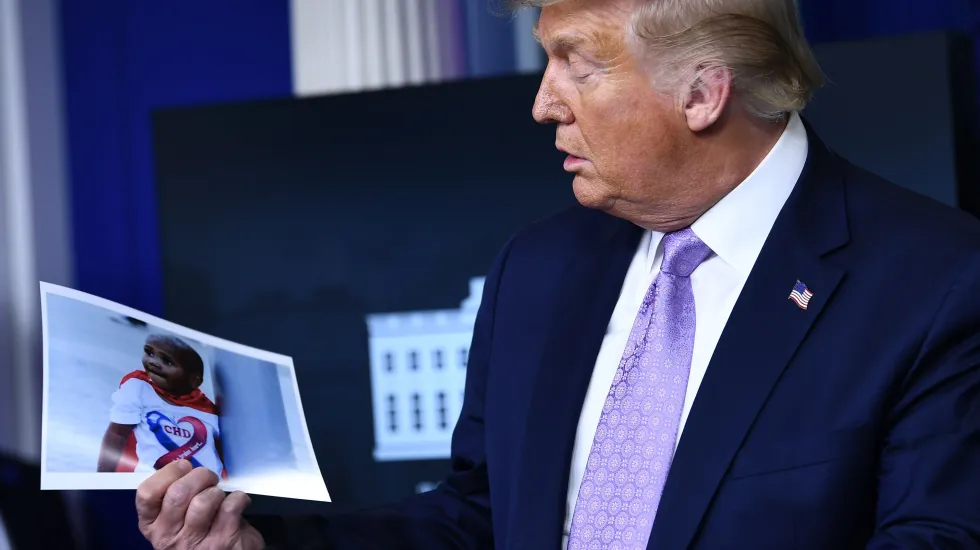
On the first day of Operation Legend — the federal crackdown on Chicago violence two years ago — a 23-year-old gang member was arrested on the West Side.
A Chicago cop riding with federal agents on July 21, 2020, spotted him standing on a sidewalk and told the agents the man was a member of the Vice Lords out on parole. The officer frisked him and found a handgun.
But a federal judge threw out that evidence, saying the officer and the agents didn’t have a reasonable suspicion to search the man.
Records show that, of the 21 cases involving gun arrests that were filed during the first two weeks of Operation Legend, he is the only one so far to win in court.
Of those 21 arrests, 13 men pleaded guilty, and nine of them have been sentenced, with eight getting prison terms averaging about three and a half years. The other man got probation.
Seven more men still await trial, and another appears to be a fugitive.
It’s been about two years since then-President Donald Trump launched the high-profile, five-month operation in the face of a surge in violence in Chicago, looking to make people arrested for crimes involving guns face tougher federal penalties than they might if prosecuted in the Cook County courts.
Authorities have said that at least 170 people were arrested in the Chicago area in Operation Legend, including 130 on gun charges and 40 on drug charges.
For context, Chicago recorded more than 770 killings that year and thousands of nonfatal shootings.
The average federal sentence of nearly four years in the cases the Chicago Sun-Times reviewed was far higher than what’s typically seen in the Cook County courts.
To determine that, the Sun-Times examined a decade of Cook County sentences in cases in which the most serious charge was illegal gun possession. The average prison sentence was less than a year — 254 days — in the approximately 4,000 cases filed between 2011 and the end of 2021. About 2,300 other cases resulted in probation, according to a Cook County database.

Operation Legend was named for 4-year-old LeGend Taliferro, who was shot and killed in his sleep on June 29, 2020, in Kansas City, Missouri. Federal agents were sent to Kansas City after the boy’s death.
The Trump administration also assigned hundreds of federal agents to work with Chicago cops. The program lasted until Trump left office in January 2021.
As the criminal cases that were brought as part of Operation Legend make their way through the courts, some new details have emerged.
In one case, Clarence January, 29, was arrested on July 28, 2020 on charges of distributing fentanyl and trafficking guns. At a bail hearing in May 2021, a prosecutor described January as a leader of the Black Disciples street gang and said that an informant had recorded him talking about his involvement in an April 2020 shooting.
The prosecutor also said that, on intercepted phone calls in 2019 and early 2020, January discussed plans to shoot others — information that resulted in the police scrambling to those locations to make sure he didn’t follow through.
At that hearing, January’s lawyer said his client shouldn’t be kept in jail until his trial because he wasn’t facing charges of firing a gun or inflicting violence. But the judge ruled that January posed a threat to the community and should stay behind bars. He’s being held at the Winnebago County Jail as he awaits trial.
In another case filed during Operation Legend, Eric Blackman, 31, pleaded guilty to being a “straw purchaser” and was sentenced to eight months in prison. Blackman, who was legally authorized to own a gun, bought one for a man who didn’t have a required Illinois state firearm owner’s permit. That gun was used in a Dec. 22, 2019, mass shooting that left 13 people wounded at a South Side home, according to a prosecutor.
“The straw purchaser plays a significant role in the gun violence that has continuously troubled the city of Chicago and threatened the public safety of its residents,” the prosecutor said in a sentencing memo in Blackman’s case.
Wendall Kemp, also arrested during OperationLegend, pleaded guilty to illegally selling three guns, including two assault rifles, to an informant.
According to a sentencing memo prosecutors filed in his case in November, Kemp had boasted to the informant that he had a large enough supply of weapons “to shake the city.”
Prosecutors asked the judge to sentence Kemp to two years in prison, but he got probation.







